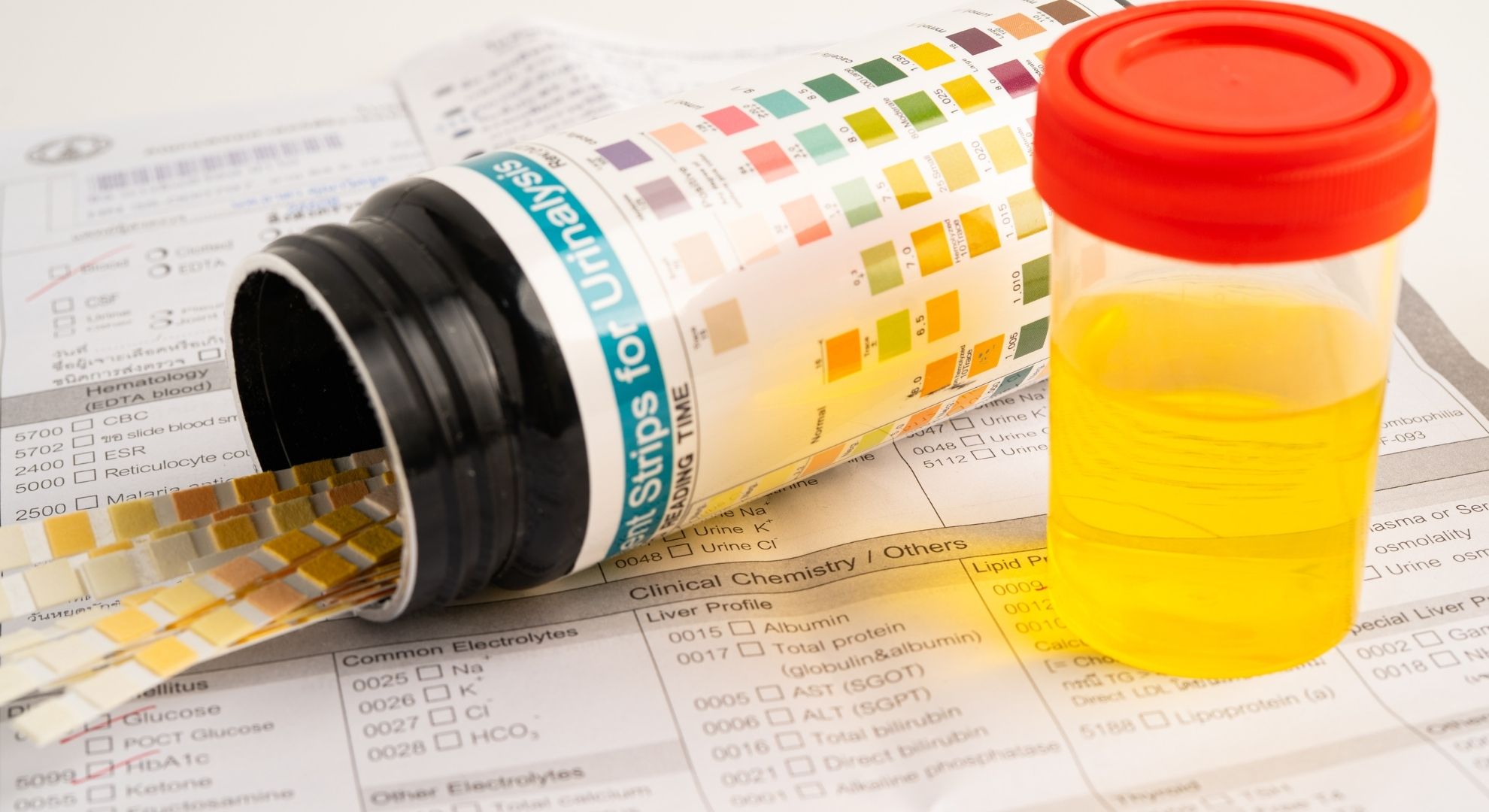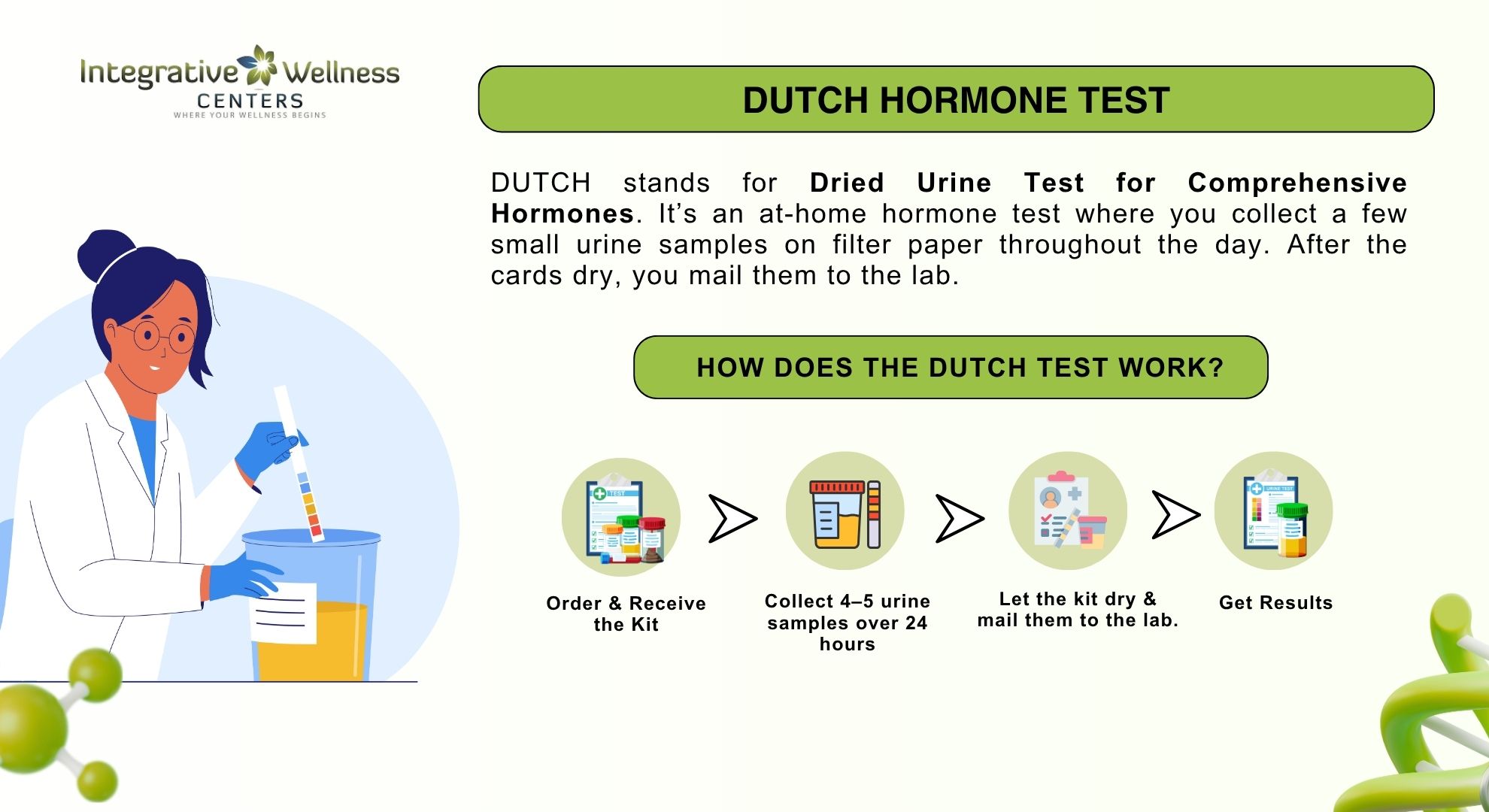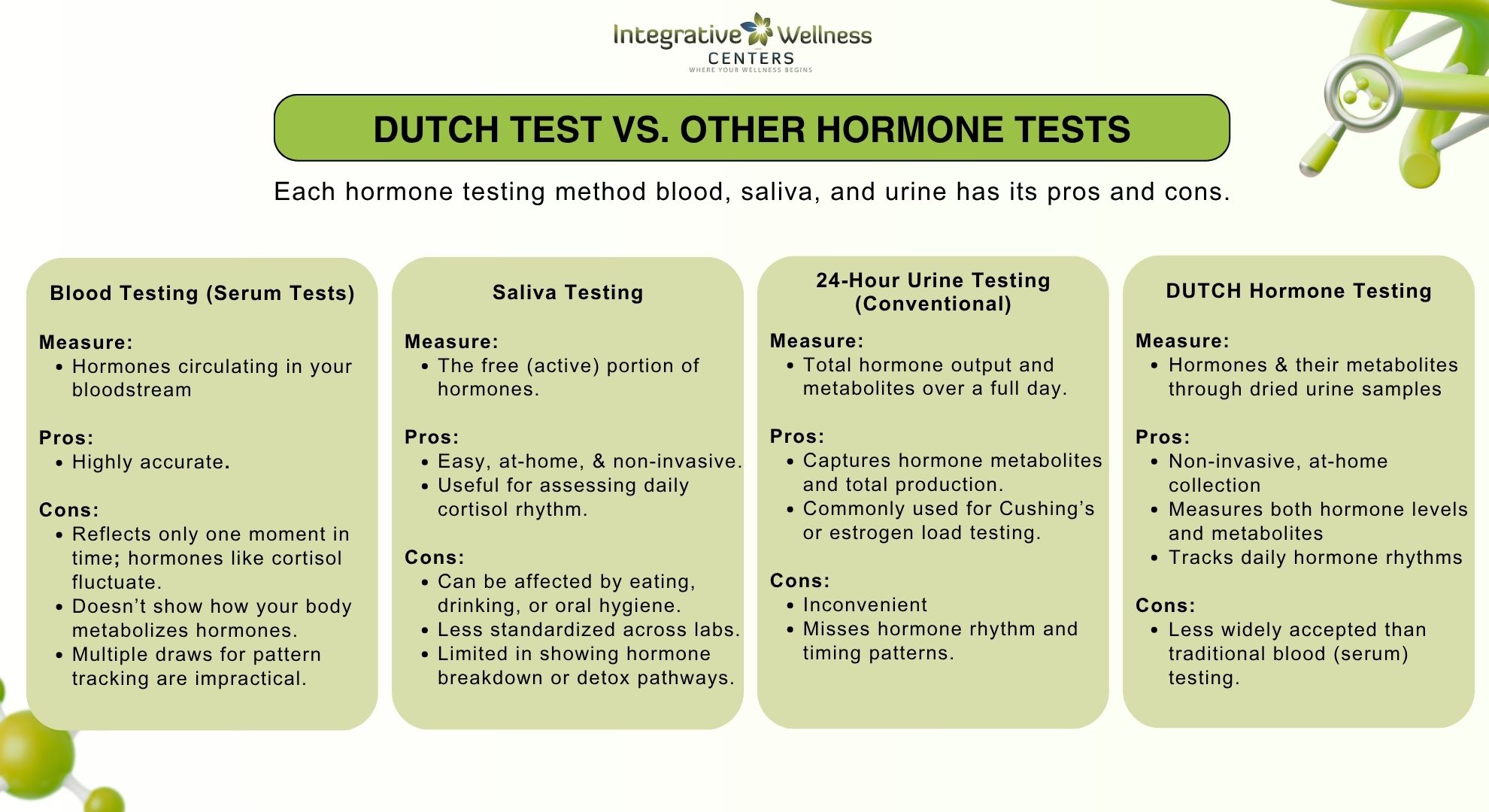Hormones play a crucial role in your overall health and wellbeing. When they’re out of balance, you might experience fatigue, mood swings, weight changes, or other unexplained symptoms.
If you’ve been feeling “off” but standard tests keep coming back normal, it might be time to dig deeper for the root cause of your issues. One advanced tool that functional and integrative medicine practitioners use is the DUTCH Hormone Test.
In this article, we’ll explore what the DUTCH test is, how it works, who might benefit from it, and why it’s a valuable part of a root-cause focused approach to health. Read more about Lifestyle Medicine: What It Is, How It Works, and Why It Matters

DUTCH stands for Dried Urine Test for Comprehensive Hormones. It’s an at-home hormone test where you collect a few small urine samples on filter paper throughout the day. After the cards dry, you mail them to the lab.
Unlike a single blood draw, DUTCH shows your hormone patterns over 24 hours and how your body is metabolizing them. The report covers sex hormones (estrogen, progesterone, testosterone), adrenal/stress hormones (cortisol, DHEA), and selected organic acid markers related to nutrient status and metabolism. The goal is to reveal hidden imbalances that may affect energy, mood, sleep, menstrual cycles, fertility, and overall health.
In simple terms, The DUTCH hormone test uses dried urine samples collected throughout the day to measure a wide range of hormones. After mailing your samples to the lab, you’ll receive a report showing your sex, adrenal, and metabolic hormone patterns helping uncover imbalances that may affect your energy, mood, fertility, or menstrual cycle.
Together, these insights offer a comprehensive view of your hormonal and metabolic health, helping your provider create a personalized plan for lasting balance.
You might be wondering if the DUTCH hormone test is right for you. This test can be especially useful for individuals who have symptoms or health concerns that suggest hormonal imbalances or dysregulation in the stress response. Consider the DUTCH test if you:
In short, anyone interested in a functional, root-cause approach to health can benefit from the DUTCH test—especially those with unexplained fatigue, mood changes, reproductive issues, or metabolic concerns.
Note: Men can also take the DUTCH test to assess testosterone, DHEA, and cortisol balance. The only part excluded for men is the menstrual cycle mapping. Also the dutch test is not recommended for postmenopausal women not on HRT (Hormone Replacement Therapy).
The DUTCH hormone test is prized for its comprehensiveness. It doesn’t just give you a single hormone reading, it provides an entire hormone profile. Here’s a breakdown of the key things the DUTCH test measures:
In short, the DUTCH test provides a comprehensive map of your hormone production, metabolism, and balance helping your provider identify where issues may arise and how to restore optimal function.
Read more What Is Functional Medicine Testing & How to Find It in Michigan

The DUTCH test is simple, convenient, and done entirely at home, no lab visits or needles required. Here’s how it works:
1. Order & Receive the Kit: Your healthcare provider (such as Integrative Wellness Centers) will determine if DUTCH testing is right for you and provide the appropriate kit—DUTCH Complete, DUTCH Plus, or Cycle Mapping for women tracking their full cycle.
2. Collect Samples at Home: You’ll collect 4–5 urine samples over 24 hours using filter paper cards. Typical times include late afternoon, bedtime, during the night (optional), upon waking, and two hours after waking. This captures your daily hormone rhythm.
3. Follow Simple Prep Guidelines:
- For women: Collect samples on day 19–22 of a typical 28-day cycle (mid-luteal phase).
- Avoid caffeine, alcohol, avocados, bananas, and fava beans for 48 hours before testing.
- Limit fluids to 1–2 liters during the collection day.
- Pause certain supplements or hormone therapies if advised by your provider.
4. Dry & Mail Samples: Let the cards dry completely, pack them in the provided envelope, and mail them to the lab.
5. Get Results (2–3 Weeks): The lab analyzes your hormone and metabolite levels. Results are sent to your provider in an easy-to-read report with graphs and color-coded ranges.
6. Review & Plan: Your provider interprets the findings and builds a personalized treatment plan which may include nutrition, lifestyle, supplements, or hormone therapy to help restore balance.
In short, the DUTCH test offers an accurate, at-home way to assess your hormone health. With expert guidance, it can uncover the patterns behind your symptoms and help you achieve lasting balance.Ready to get clarity on your hormones?
Schedule an appointment at Integrative Wellness Centers to discuss if the DUTCH test is a good option for you.
Why choose the DUTCH test over standard hormone tests? Here are some of the unique benefits and advantages of DUTCH hormone testing, especially from a functional or root-cause medicine perspective:
Overall, the DUTCH hormone test provides an in-depth, functional view of hormone health, empowering both you and your provider to create targeted, effective, and sustainable wellness plans.
While the DUTCH test is a powerful tool, it’s important to understand its limitations and why it may not be appropriate or necessary for everyone. Here are some of the main limitations and considerations of the DUTCH hormone test:
In summary, the DUTCH test offers powerful insights but must be used wisely—with the right context, expertise, and complementary testing. At Integrative Wellness Centers, we use it as one piece of your broader functional health puzzle, ensuring that testing leads to meaningful, patient-centered care.

Each hormone testing method blood, saliva, and urine has its pros and cons. Here’s how the DUTCH test stacks up:
What it measures: Hormones circulating in your bloodstream at the time of the draw.
Pros:
- Gold standard for most hormones (e.g., thyroid, FSH/LH).
- Highly accurate and covered by insurance when ordered by a doctor.
Cons:
- Reflects only one moment in time; hormones like cortisol fluctuate.
- Doesn’t show how your body metabolizes hormones.
- Multiple draws for pattern tracking are impractical.
What it measures: The free (active) portion of hormones.
Pros:
- Easy, at-home, and non-invasive.
- Useful for assessing daily cortisol rhythm.
Cons:
- Can be affected by eating, drinking, or oral hygiene.
- Less standardized across labs.
- Limited in showing hormone breakdown or detox pathways.
What it measures: Total hormone output and metabolites over a full day.
Pros:
- Captures hormone metabolites and total production.
- Commonly used for Cushing’s or estrogen load testing.
Cons:
- Inconvenient and easy to collect incorrectly.
- Misses hormone rhythm and timing patterns.
The DUTCH test bridges the gap:
- Like saliva, it’s non-invasive and at-home, allowing multiple collections over the day.
- Like urine testing, it measures metabolites and total production—giving a fuller picture of hormone metabolism.
- It shows daily patterns, including cortisol curves and melatonin rhythms, that blood or conventional urine tests can’t.
Drawbacks:
- Not as widely accepted as serum testing.
- Requires following a specific collection schedule.
- Typically not covered by insurance.
👉 Interested in a hormone evaluation? Our team at Integrative Wellness Centers offers both standard labs and advanced panels like DUTCH to help you find the right testing approach for your needs.
While the DUTCH test isn’t a diagnostic tool for diseases, it offers valuable insight into your body’s hormone activity. By mapping hormone patterns, it helps practitioners understand what may be driving your symptoms and guides personalized treatment. Here’s what it can help reveal:
In essence, the DUTCH test acts like a hormonal roadmap. it doesn’t diagnose disease, but it helps you and your provider see where imbalances may be hiding.
If you’re looking for a DUTCH hormone test in Michigan, Integrative Wellness Centers is one of the leading clinics offering this advanced functional hormone assessment. Our experienced functional medicine team specializes in root-cause hormone health, combining the DUTCH test with comprehensive lab evaluations to uncover why your hormones may be out of balance.
We don’t just provide testing, we translate your DUTCH results into a clear, personalized plan for recovery. Whether you’re dealing with fatigue, PMS, menopause, adrenal stress, or other hormone-related issues, our doctors create evidence-based treatment plans that may include nutrition, lifestyle optimization, and natural hormone support.
You can visit our Michigan clinic or schedule a telehealth consultation from anywhere in the state.👉 Schedule your DUTCH hormone test with Integrative Wellness Centers today!
1: What is root cause medicine, and how does it relate to hormone testing?
Root cause (functional) medicine focuses on identifying why imbalances occur—such as stress, gut issues, or poor detoxification—rather than just treating symptoms. The DUTCH test helps uncover these underlying patterns, offering insights that guide a more personalized, long-term healing plan.
2: Is the DUTCH test accurate and reliable?
Yes, the DUTCH test is widely trusted in functional medicine and developed by Precision Analytical. It’s backed by internal validation and correlates well with other hormone testing methods. While not FDA-cleared, it provides valuable insights when interpreted by an experienced practitioner.
3: How much does it cost, and is it covered by insurance?
The DUTCH test typically costs between $300–$600, depending on the panel. It’s usually not covered by insurance, but HSA or FSA funds can often be used. At Integrative Wellness Centers, we’re transparent about pricing and only recommend the test when it adds real value to your treatment plan.
4: Can men take the DUTCH test?
Absolutely. The DUTCH test isn’t just for women—it also measures testosterone, DHEA, and cortisol, making it useful for evaluating men’s hormone balance, energy, and stress response.
5: How do I get a DUTCH test?
It’s best to order the test through a healthcare provider who can interpret the results. At Integrative Wellness Centers, we offer both in-person and telehealth options. After a consultation, we’ll provide the kit, review your results, and build a personalized plan for you.
6: How long do results take?
Once mailed, results typically take 2–3 weeks. Your provider will then review the findings with you and explain the next steps for balancing your hormones naturally.
7: Are there alternatives if I can’t afford the DUTCH test?
Yes. Conventional blood or saliva tests can provide basic hormone insights. We often start there and upgrade to DUTCH later if needed. Our goal is to work within your budget while still addressing your root health concerns.
8: Should I get DUTCH testing if I'm menopausal?
It depends. If you're in natural menopause and not on hormone replacement therapy, DUTCH testing typically isn't necessary since your estrogen and progesterone are already known to be low. Standard blood tests (like FSH/LH) can confirm menopausal status if needed. However, if you're on HRT or considering it, DUTCH becomes very valuable for monitoring how your body processes hormones, optimizing your dosing, and ensuring safe metabolism—especially important for estrogen metabolite assessment.
No more guessing, no more dead ends, no more endless referrals.
Request A Consultation